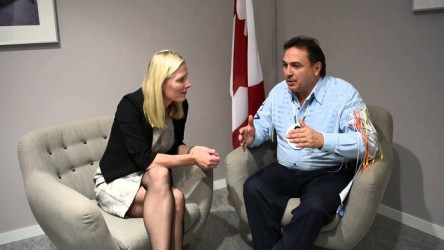Article Origin
Volume
Issue
Year
Canada’s Indigenous people had strong representation at the Paris climate change conference where 195 countries came together to negotiate a practical plan to deal with greenhouse gas emissions to slow down climate warming.
Assembly of First Nations National Chief Perry Bellegarde accompanied Prime Minister Justin Trudeau and two federal ministers in the four-person Canadian delegation to the opening ceremony. He was invited by Environment and Climate Change Minister Catherine McKenna.
“We haven’t been part of the problem when it comes to climate change, but Indigenous peoples can definitely be part of the solution,” said Bellegarde.
In his opening address at COP21, Trudeau said Indigenous people knew how to care for the planet and the rest of the world could learn from them.
“What a very powerful statement from our Prime Minister. He understands the important role of our peoples to protect our environment,” said Bellegarde.
But despite Canada’s acceptance of the role Indigenous peoples can play in addressing climate change, having a reference to Indigenous peoples included in the Paris declaration, both in the preamble and the body of the text, has proven to be a battle.
And that bothers Bellegarde.
“But if we don’t do that strategic lobby nationally and internationally, our voices will get put to the side and that’s not really in the best interest of Canada or the world,” he said. †While Bellegarde left Paris after the first couple of days, Northwest Territories Regional Chief Bill Erasmus, Manitoba Regional Chief Kevin Hart and a number of other AFN leaders remained on.
Also in Paris were Inuit Tapiriit Kanatami President Natan Obed and Congress of Aboriginal Peoples’ National Chief Dwight Dorey.
“There has to be some serious consideration and inclusion in the negotiations of our people to ensure that the interests of Indigenous people throughout Canada, regardless of their residency and status, that their rights are protected,” said Dorey.
CAP represents Aboriginal people living off-reserve. Dorey said urban-dwellers also have the inherent right to hunt, fish, gather and trap, and many do so in order to provide for their families.
The Paris declaration has a direct impact on that right, said Dorey.
“The whole process is about climate change, trying to ensure that issues relative to the changing climate are minimized as it effects our people, Indigenous peoples of Canada. It’s very important. It impacts upon our peoples’ traditional way of life, traditional knowledge,” he said.
Bellegarde points out that it is the Indigenous peoples who feel the impact of climate change first. He says that impact is already noticeable with the melting of icebergs in the north; the rising of ocean waters and the flooding of the lands; the loss of plant species; the movement of grizzly bears and ants going north, and ravens heading south.
“There’s this whole switch-up that’s going on in the environment,” he said.
That “switch-up” and the talks in Paris have people like Jessie Cardinal, coordinator with Keepers of the Athabasca in Alberta, concerned.
“Today, many are gathered in …one of the biggest international climate change gatherings in world history, in Paris, France. And while I sit here in northern Alberta, I pray, that these leaders, will have some concrete plans and actions, solutions that we can all adopt, that will help save our winter. Many promises will be made, but what real actions will be taken and will the actions be big enough, smart enough and fast enough to tackle this mess we have got ourselves in, our dependence on extracting everything, at any cost, with no regard for the future,” wrote Cardinal in a piece entitled, Where is the snow?
For Dorey, the answer is to have Indigenous concerns included in the Paris declaration.
“One of the benchmarks I’m looking at is the United Nation Declaration on the Rights of Indigenous Peoples. We fought long and hard to get the protections that we feel are needed through that process. And Canada has signed on to the national agreement. What I’m trying to do is ensure we don’t lose ground. When it comes to climate change issues we want to ensure that those protections we got under that declaration remain.”
Up until the last days, McKenna was reaffirming Canada’s position on the importance of including human and Indigenous rights in the document.
The United Nations conference on climate change concluded on Dec. 11. Every year since 1992 the Conference of the Parties has taken place with negotiators trying to put together a practical plan of action. This year’s COP21 in Paris was the last chance for this process. Negotiators agreed in 2011 that a deal had to be done by the end of 2015, and an agreement was indeed reached. The deal can be read here: http://unfccc.int/resource/docs/2015/cop21/eng/l09.pdf
Photo caption: Environment and Climate Change Minister Catherine McKenna and Assembly of First Nations National Chief Perry Bellegarde chat during COP21.
- 1781 views

